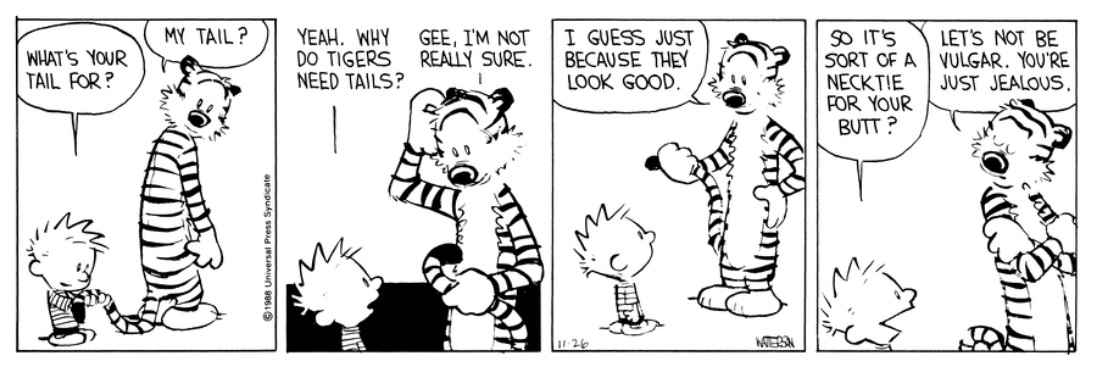March 19, 2024
Calvin et Hobbes : la queue
« A quoi ça sert, ta queue ? », demande Calvin à Hobbes.
« Ma queue ? », répond Hobbes, perplexe.
« Ouais, pourquoi les tigres ont-ils besoin d'une queue ? », demand Calvin.
« Eh bien, j'sais pas vraiment », répond Hobbes.
« Je suppose que c'est parce qu'elles sont jolies », suggère-t-il
« Alors, c'est une espèce de cravatte pour ton cul ? », demand Calvin.
« Ne soyons pas vulgaires. T'es juste jaloux, c'est tout », répond Hobbes.
(read attached comic strip)

Calvin et Hobbes : la queue
« A quoi elle/ça sert, ta queue ?
», demande Calvin à Hobbes.
Opening quotation mark («) at the beginning of a dialogue, closing one at the end (»); short phrases like "demande Calvin à Hobbes" don't "break" the dialogue
Tiret long (—) every time the speaker changes
«— Ma queue ?
», répond Hobbes, perplexe.
«— Ouais, pourquoi les tigres ont-ils besoin d'une queue ?
A 6yo boy like Calvin wouldn't used something as formal as a subject-verb inversion
The most common syntax in colloquial speech is by far the syntax of affirmative sentences
», demande Calvin.
«— Eh bien, j'sais pas vraiment », répond Hobbes.
Even more colloquial => eh ben
« Je suppose que c'est parce qu'elles sont jolies », suggère-t-il
¶.¶
¶
«
¶
— Alors, c'est une espèce de cravatte pour ton popotin/cul ?
"cul" is rather "ass"; since "butt" is slightly less vulgar, it would correspond to something like "popotin" in French
», demande Calvin.
« Ne soyon— Sois pas vulgaires.
The 1PP imperative is also quite formal, "sois pas vulgaire" would be more idiomatic
T'es juste jaloux, c'est tout. », répond Hobbes.
Feedback
Avoiding "demande/répond X thing" every time would make the text lighter, but that's a good translation of this great comic strip overall!
|
», demand Calvin.
|
|
Calvin et Hobbes : la queue This sentence has been marked as perfect! |
|
« A quoi ça sert, ta queue ? « A quoi elle/ça sert, ta queue ? |
|
», demande Calvin à Hobbes.
Opening quotation mark («) at the beginning of a dialogue, closing one at the end (»); short phrases like "demande Calvin à Hobbes" don't "break" the dialogue Tiret long (—) every time the speaker changes |
|
« Ma queue ?
|
|
», répond Hobbes, perplexe.
|
|
« Ouais, pourquoi les tigres ont-ils besoin d'une queue ?
A 6yo boy like Calvin wouldn't used something as formal as a subject-verb inversion The most common syntax in colloquial speech is by far the syntax of affirmative sentences |
|
« Eh bien, j'sais pas vraiment », répond Hobbes.
Even more colloquial => eh ben |
|
« Je suppose que c'est parce qu'elles sont jolies », suggère-t-il « Alors, c'est une espèce de cravatte pour ton cul ?
"cul" is rather "ass"; since "butt" is slightly less vulgar, it would correspond to something like "popotin" in French |
|
», demand Calvin.
|
|
« Ne soyons pas vulgaires.
The 1PP imperative is also quite formal, "sois pas vulgaire" would be more idiomatic |
|
T'es juste jaloux, c'est tout », répond Hobbes. T'es juste jaloux, c'est tout. », répond Hobbes. |
You need LangCorrect Premium to access this feature.
Go Premium